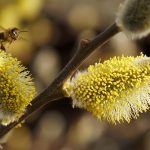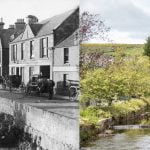One major strand of our ‘Museum of Rapid Transition’ work in 2021 was to design a set of activities that aimed to mobilise different aspects of our heritage to encourage people to take every day climate action.
Co-designed with willow weave and climate literacy expert Jane Wilkinson, and focusing on food, energy, travel and clothing, we called them our INHERITage sessions and we ran 14 of them over the course of the summer and early autumn in Alyth, Blairgowrie and Kirriemuir.

A Blairgowrie bairn about to have a taste of her first Bannock!, photo Clare Cooper
Bring Back the Bannoch took this ancient Scottish food and told its story in such a way as to emphasise the importance of sourcing local, sustainable food. After the sessions, nearly 56% of participants who responded said that as a result of taking part in the session they would buy more locally grown food, just over 33% said they would make their own bannocks and just over 11% said they would find out more about their food heritage.
Not A Patch on the Plaid focused on this iconic item of Scottish clothing and used the history of how it was worn and made to last to critique our ‘Fast Fashion’ economy. 50% of participants who chose to offer feedback afterwards said they would mend more of their own clothes and 50% said they would – forthwith – wear the Plaid!

First time donning and wearing the Great Plaid, photo Clare Cooper
The Curragh or the Car? juxtaposed one of the common ways people moved through the landscape in past times – the curragh or coracle, with the most popular way we move around the landscape now, the car, in order to promote discussion about the carbon footprint of our modern travelling habits. In answer to our feedback question ‘What new knowledge did you gain?’ a few of the many comments from participants included: ‘How the coracles were used and some amazing journeys that were done’. ‘Gosh! Where do we start?! From the history of the coracle and how far it enabled people to travel, to its use in Wales today and also in Scotland’. ‘The teaching of its construction and square lashing was fascinating!’ ‘Learning how to paddle is definitely a tricky thing to master but again so enjoyable.’ ‘Had not appreciated what distances coracles could travel, also how damaging car travel is for the planet.’

Learning how to paddle the coracle with Jane Wilkinson, photo Clare Cooper
Hearth is where the Home is tracked the nature of the ‘hearth’ throughout human history to show how disconnected we have become from how we heat our homes with participants feeding back that the session would definitely make them think more about how to reduce their carbon footprint overall.
By Leaves We Live re-introduced people to how wild food was harvested in the past. Asked afterwards whether participating in the session would influence what and how you eat in the future? Nearly 67% said ‘Very Likely’ and 33% said ‘Likely’.

Foraging on Alyth Hill, photo Clare Cooper
This first run of our INHERITage sessions was made possible by funding from the Gannochy Trust and is part of the Cateran Ecomuseum’s 2021 Museum of Rapid Transition Programme in partnership with Alyth Development Trust. We’re aiming to create regular opportunities for these sessions to run again and more widely across the Ecomuseum in the future, so join our mailing list or keep an eye out for more dates on our social media.

